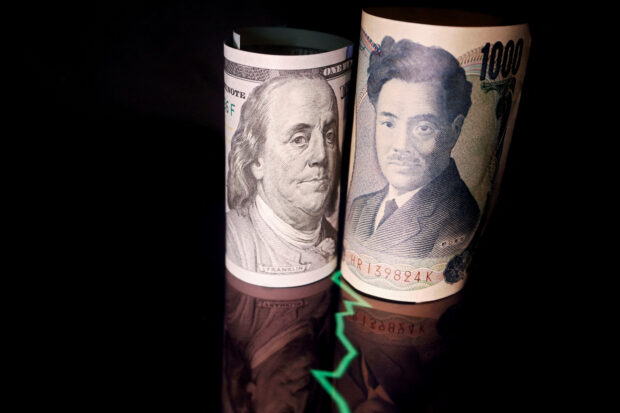
Japanese yen and U.S. dollar banknotes are seen with a currency exchange rate graph in this illustration picture taken June 16, 2022. REUTERS/Florence Lo/Illustration/File photo
LONDON/TOKYO — The U.S. dollar hit its highest in almost five months on Tuesday as stronger-than-expected economic data caused investors to cut their bets on a June rate cut, boosting the currency.
Fears of intervention by Japanese officials slowed the dollar’s gains against the yen, however, even as long-term U.S. Treasury yields – which the currency pair tends to track – jumped to a two-week top overnight.
The dollar index rose to 105.1 on Tuesday, its highest level since Nov. 14, adding to sharp gains on Monday after U.S. data unexpectedly showed the first expansion in manufacturing since September 2022. It last stood at 105, unchanged from Monday.
The euro fell to its lowest since mid-February and was not far off its November lows, trading down slightly at $1.0732. Data on Tuesday showed that the euro zone factory downturn deepened again in March.
Sterling was little changed at the bottom end of its recent range and near its lowest since December at $1.2558.
Monday’s U.S. ISM manufacturing survey data also showed a sharp rise in a measure of prices in the sector, adding to investors’ concerns that inflation will be slow to fall back to 2 percent, delaying the Federal Reserve’s first rate cut.
READ: US manufacturing recovering; raw material prices pose challenge
Fed Chair Jerome Powell on Friday said the central bank was in no hurry to lower borrowing costs after data showed a key measure of inflation rose slightly in February.
“This (dollar) strength is an extension of the move seen late last week when the Federal Reserve’s Christopher Waller delivered a less dovish speech,” said Chris Turner, head of global markets at ING.
Turner said U.S. job openings data could weigh on the dollar later in the day if it shows a fall in vacancies.
“Any reversal in this dollar strength – if it does come – will have to be data-driven,” he said.
Yen flat
The Japanese yen was last flat at 151.58, after earlier dipping to 151.79. It has traded in a tight range since reaching a 34-year trough of 151.975 on Wednesday, which spurred Japan to step up warnings of intervention.
On Tuesday, Finance Minister Shunichi Suzuki reiterated that he would not rule out any options to respond to disorderly currency moves.
READ: Japan ready to take action vs excessive yen volatility – finance chief
Japanese authorities intervened in 2022 when the yen slid toward a 32-year low of 152 to the dollar.
The yen’s decline has come despite the Bank of Japan’s first interest rate hike since 2007 last month, with officials cautious about further tightening amid a fragile exit from decades of deflation.
Officials are “wary of backing themselves into a corner by drawing a line in the sand at 152”, said Nicholas Chia, Asia macro strategist at Standard Chartered.
“The rationale of jawboning and intervening in FX markets is mainly to buy time for the JPY in the hopes that USD strength wanes and recedes.”
Elsewhere, China’s yuan fell to a 4-1/2-month low as a strong dollar offset selling of the U.S. currency by state-owned banks. The yuan fell to a low of 7.2357 per dollar on the day, its weakest level since November 2023.
Bitcoin declined 4.8 percent to $66,400 following a sudden drop of more than $3,000 in the space of about 15 minutes in the highly volatile cryptocurrency.